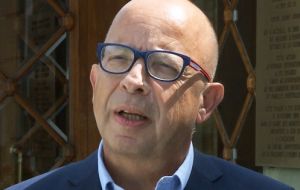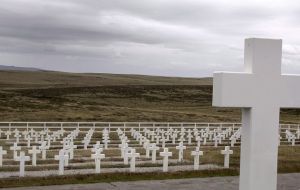MercoPress. South Atlantic News Agency
Falklands Darwin cemetery: Red Cross identification mission begins round of talks in Argentina
 Laurent Corbaz is head of the Humanitarian Project Plan and begins this week a round of talks in Buenos Aires (Pic ICRC)
Laurent Corbaz is head of the Humanitarian Project Plan and begins this week a round of talks in Buenos Aires (Pic ICRC)  The Darwin cemetery in the Falklands has 237 graves of Argentine combatants of which 123 remain as “”known only to God” (Pic EPA)
The Darwin cemetery in the Falklands has 237 graves of Argentine combatants of which 123 remain as “”known only to God” (Pic EPA) A delegation from the International Committee of the Red Cross is scheduled to begin this Monday a round of contacts in Buenos Aires related to the Humanitarian Project Plan for the identification of unknown Argentine combatants buried at the Darwin cemetery in the Falkland Islands.
The delegation is made up of Laurent Corbaz, head of the Plan, ICRC regional delegate for Argentina, Brazil, Chile, Paraguay and Uruguay, Lorenzo Caraffi and Diego Alonso Rojas Coronel, head of the local branch in Argentina.
The round of contacts includes Argentine foreign ministry officials, members of the Human Rights secretariat, and other areas of the Argentine government that are helping with the identification project, and follows a previous visit to the Falkland Islands and contacts with Geneva headquarters.
The visit is part of the Plan agreed and signed last 20 December in London between Argentina's deputy foreign minister Pedro Villagra Delgado, UK foreign minister Alan Duncan and the president of the ICRC Peter Maurer, with the consent and presence of Falkland Islands government representatives.
The Plan consists in the identification of remains in 123 of the 237 graves at the Darwin cemetery, marked with a cross which reads Argentine soldier, only known by God”. The remains at the cemetery date back to the conflict of 1982 when Argentina invaded the Falkland Islands.
According to the Plan, DNA samples from remains at the Darwin cemetery, collected by a group of forensic experts, will be analyzed at a special anthropology forensic laboratory in Cordoba, with random double checks in similar labs in UK and Spain. Relatives should have access to the information several weeks after the identification process at Darwin is ended.
Work is expected to begin in the third week of June (19) with forensic experts named by Argentina and UK, and accepted by the ICRC. Argentine experts have world reputation for their work identifying hundreds of remains of victims of human rights, both in Argentina and worldwide.
According to the protocol agreed remains will be exhumed one at a time, DNA samples will be taken from skeleton tissue, then reburied immediately in appropriate caskets. Experts will have several containers for labs and other facilities next to the cemetery, which will remain strictly out of bounds for media and the public.
The ICRC role has been described as “exclusively humanitarian” and with “neutral intermediation”, which guarantees the remains will be treated with the utmost dignity all along the process and graves will be returned to their original condition.
During the weeks of work at Darwin, ICRC will regularly transport, in batches, the samples to the laboratory in Cordoba, where DNAs will be profiled and compared with the bank of relatives' DNA samples.
So far according to Argentine official sources, 95 of the 123 families have consented to the process and rendered blood samples stored in Cordoba. This was done following complaints from the Malvinas Fallen next of kin who complained about the procedure implemented by the previous Argentine government.
Random samples from Darwin will be also sent to the genetics forensic labs at the Lancashire University in Preston, and to the Santiago de Compostela University in Spain to double check the DNA crossings.
Each sample extracted at Darwin cemetery will have a detailed report including of those remains that could not identified, as well as recommendations for further tests.
It is estimated the whole operation will cost over a million US dollars to be financed by Argentina and UK governments. This includes all layouts.
The final toll of the 1982 Argentine invasion and 74-day conflict was 649 Argentines, 255 British and three Falkland Islanders killed.




Top Comments
Disclaimer & comment rules-

-

-

Read all commentsThink - Have no problem at all if that is what each family decides of their own free choice and will.l Just that they are not pressurised by the Arg Govt nor public opinion over there.
May 29th, 2017 - 06:46 pm +5Oh - the soil in that Cemetery is way above your dirty politics version - it belongs neither to Falkland Islands Govt nor Argentina - it belongs to those lads who lie their, in peace - and their God(s) - and to NOBODY else.
One question. Why is the UK government funding any of this?
May 29th, 2017 - 09:49 am +4After the Argies surrendered and the war was over the UK government offered to ship all the Argie dead back home to the mainland but the government of the Republic of Argentina refused to accept them.
One bit missed from the article- those remains identified- the families will then have the option from the ICRC do they wish their loved one,s remains reburied permanently at Darwin - or repatriated to their hometown. It will be the families choice - wether Arg Govt will try and pressurise the families in the name of their foul politics remains to be seen.
May 29th, 2017 - 03:54 pm +4Am sure we the Islanders will respect the decision of the Family concerned- so long as it has been freely made.
Commenting for this story is now closed.
If you have a Facebook account, become a fan and comment on our Facebook Page!